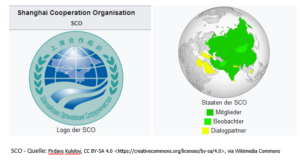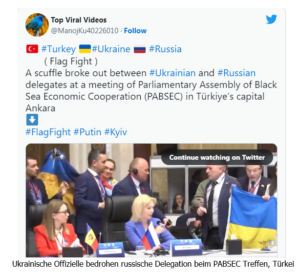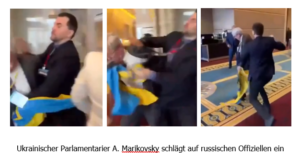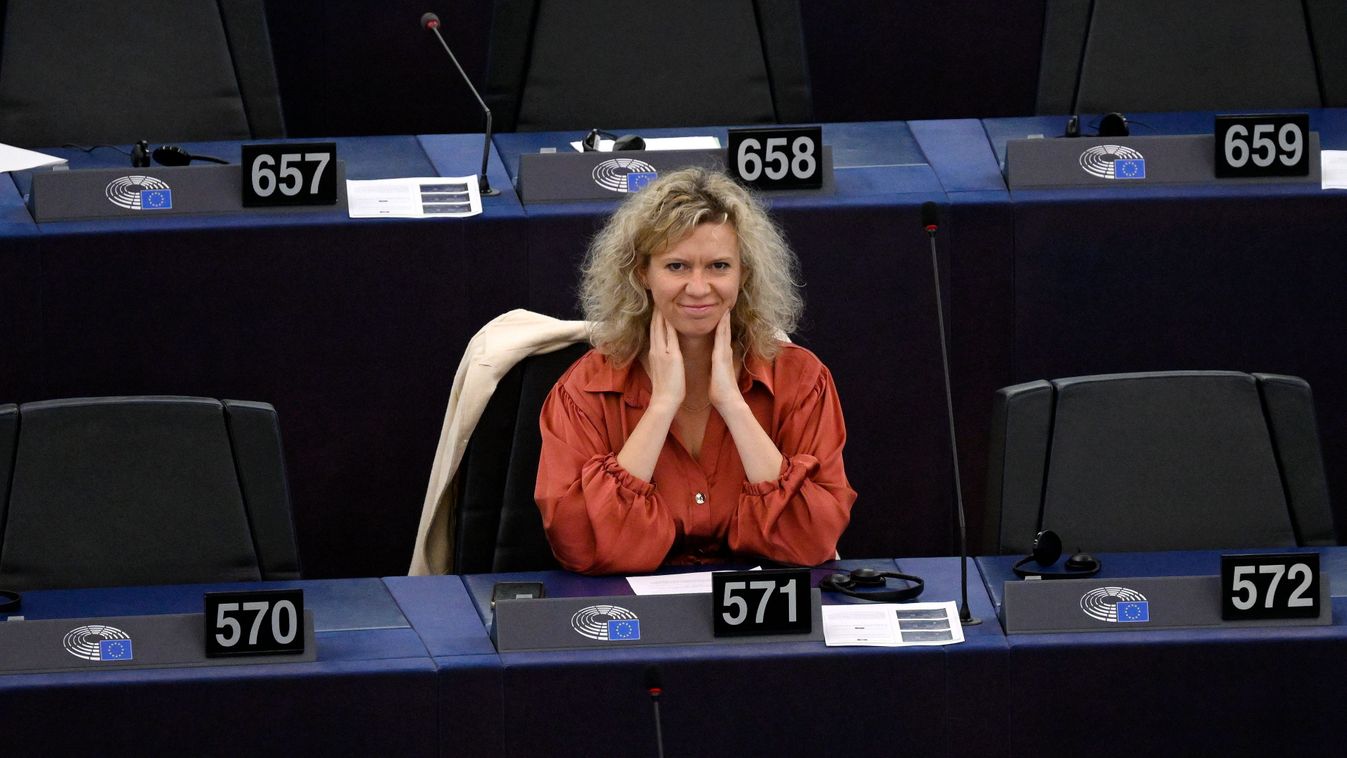Foreign Minister Sergey Lavrov’s remarks and answers to media questions following the SCO Foreign Ministers Council meeting, Panaji, May 5, 2023

Good afternoon!
We have concluded the meeting of the Foreign Ministers Council of the Shanghai Cooperation Organisation. We have prepared “directions,” which are yet to be coordinated ahead of the SCO summit scheduled for June-July 2023. Schedules for the heads of state are being finalised right now. It is understood that a large package of documents will be approved, primarily a political declaration, as well as a number of statements on de-radicalisation, digital transformation, healthcare and other areas.
We have a common vision of problems persisting in the international arena. Our shared desire is to coordinate our actions at the UN and on the Eurasian continent with such organisations as the EAEU and ASEAN, and more globally, to cooperate with the BRICS countries.
We have paid attention to both the economic and humanitarian agendas.
- There is an initiative advanced by President of Russia Vladimir Putin to coordinate the creation of an SCO sports association.
- We also suggest establishing a medical association.
- Our colleagues from Central Asia are interested in promoting cooperation on information security and the fight against organised crime and drug trafficking in the SCO space. We think it is important to establish relevant divisions and let them be coordinated by the SCO Regional Anti-Terrorist Structure.
We still have time, though not much. There is a shared commitment to hold a successful SCO Summit in New Delhi in the summer of 2023.
Question: The BRICS countries are talking about introducing a common currency for mutual settlements. Is it true that it is going to be called “BRIC”? Has there been any discussion about the possibility of SCO countries using such a currency?
Sergey Lavrov: The name of the currency is the least important thing. You are right, the main thing now is to look at practical issues that will safeguard cooperation of independent, autonomous states against hostile actions by the West, abusing its position in the world economy, as well as against actions by the US abusing the dollar’s position as a reserve currency. The euro also uses similar ugly approaches.
There is an understanding that the role of national currencies in settlements between SCO members should be increased. Practices currently taking shape within the Eurasian Development Bank, the Asian Bank for Reconstruction and Development and the BRICS New Development Bank could be used for this purpose. All this has been discussed and is relevant.
Speaking of the BRICS New Development Bank, we took note of the initiative that has been repeatedly voiced by President of the Federative Republic of Brazil Lula da Silva: to switch to our own currencies with the prospect (this is quite possible) of creating an aggregate currency. All of this is now being analysed by our countries’ relevant agencies – finance ministries and central banks. This work is in progress. It cannot be stopped now.
Question: Moscow has called the drone attack on the Kremlin an act of terror. Has Russia notified its SCO partners about its position via diplomatic channels? How can Russia`s attitude to China’s peace plan change in this context? Can you comment on what happened in Ankara yesterday, when a Ukrainian deputy actually attacked a member of Russia’s State Duma delegation? How long will we put up with such behaviour?


Sergey Lavrov: Regarding the terrorist attack on the Kremlin and the President’s residence, our views have been provided. Nearly everyone I talked with yesterday expressed their disapproval. For example, Foreign Minister of the Islamic Republic of Pakistan Bilawal Bhutto Zardari openly condemned the terrorist attack and expressed the hope that the truth would be established and the culprits identified without delay.
As for how this can influence the situation in Ukraine, I believe that we should stop waiting for new incidents and provocations. Vladimir Zelensky and his team are doing everything possible in the media environment and in practice to dampen the desire of self-respecting countries to communicate with them. This is so. We see that this understanding is growing.
Nevertheless, we never refused to settle the problems that have been created by the United States and its satellites’ efforts to supply of weapons to Ukraine for confrontation with Russia. We see a growing awareness of the fact that these problems cannot be settled on the contact line in Donbass. Some people would like to freeze that line and then to think about what to do with the overall situation.
The geopolitical nature of the current events is obvious to everyone, and it is also obvious that the crises in Ukraine and other parts of the world cannot be settled without settling the main geopolitical issue, which is the desire of the West to maintain its hegemony and to dictate its will to all and sundry.
It you read China’s 12-point peace plan carefully, you will see that Ukraine is only mentioned once, in the headline. The rest of the text has to do with ensuring indivisible security and pledging not to pursue one’s own security at the expense of others’ security and not to adopt illegitimate unilateral sanctions. These issues cannot be settled with Vladimir Zelensky, who is a Western puppet, but only directly with his handlers. We have long been ready for this dialogue. We submitted our proposals in 2009, and the last time we sent them to the Americans and to the NATO Headquarters in December 2021. The West arrogantly rejected our proposals. But we will eventually have to discuss this issue, seek solutions to all these problems and return to the fundamental principles of the UN Charter, first of all the principle of sovereign equality of states. This discussion will be held sooner or later. We are ready for this. We are patient people.

Question: Following the terrorist attack over the Kremlin, many well-known politicians called this a casus belli. How appropriate is it, in your opinion, to use ancient Roman terminology in conditions of hybrid standoffs? How can we use these terms if they remain topical in such situations? How will this impact relations between Russia and Washington that could not have been unaware of Ukraine’s intentions?
Sergey Lavrov: Just like with the potential new currency, I don’t think we need to dwell on the name or terminology.
This was a hostile act. It is absolutely clear that the terrorists in Kiev could not have perpetrated it without notifying their masters. We will respond with specific actions, rather than discussions as to whether this is a casus belli or not.
I want to say once again that we are very patient. There is a saying that Russians are slow to saddle up, but ride fast.
I have noted a statement by US Secretary of State Antony Blinken that the United States will not tell Kiev what methods they should use to defend the sovereignty of Ukraine. This statement probably says everything.
Question: One of the provisions of the Russian foreign policy strategy deals with the new international order. What role should the Shanghai Cooperation Organisation play in the international order proposed by Russia?
Sergey Lavrov: The new Foreign Policy Concept of the Russian Federation, approved by President of Russia Vladimir Putin in March 2023, highlights the SCO’s role in a new international order. It lists the SCO as one of the centres of an emerging multipolar international order, along with the EAEU, the CSTO, the CIS, ASEAN, regional associations of developing countries in Africa, Latin America and Asia.
In 2016, a major step was taken in this direction when President Putin, speaking at the Russia-ASEAN Summit, put forward the idea of creating a Greater Eurasian Partnership involving the SCO, the EAEU and ASEAN. We believe that any other state or organisation existing on our vast shared continent should be free to join this Eurasian partnership. Understandably, our shared location creates a serious competitive advantage for strengthening the positions of our region in the global economy, financial system and transport chains. All this calls for substantial work. However, the basic line has been set, and we are starting out.
Question: What is Afghanistan’s status within the SCO? Afghanistan is still an SCO observer state, although, not a single member state has recognised its new government. Will the upcoming summit take any decisions in this regard?
Sergey Lavrov: Today, we came to terms on reaffirming the SCO-Afghanistan Contact Group. This group exists, although it has been some time since it met. One of the reasons is the Taliban’s status. Thus far, it is not recognised “de jure.” We are expecting the Taliban leaders to fulfil their promises on forming an inclusive government not only in terms of ethnic groups but also by ensuring the presence of the entire spectrum of Afghanistan’s political forces. This has yet to be done. We are monitoring the implementation of their assurances that they will respect human rights, ensure security in the territory of Afghanistan, and eradicate the threats of terrorism and drug trafficking. All of our SCO colleagues have taken a united position on this.
I am confident that the proposal we introduced today – to convene the SCO-Afghanistan Contact Group as soon as possible – will be implemented. In fact, the situation calls for urgent measures. The Americans are again attempting to interfere in Afghanistan’s internal affairs. There is convincing evidence to the effect that the United States supports the terrorist groups entrenched in the territory of Afghanistan that are opposed to the Taliban, including the Islamic State, the Islamic Movement of East Turkestan, and Al-Qaeda. The Americans have not abandoned their attempts to reintroduce US military infrastructure in the region surrounding Afghanistan, in Central Asia. Everyone is well aware of the serious threat inherent in these attempts. We will resolutely oppose them.
Question: Was the recent attack on the Kremlin discussed during the bilateral meeting with Foreign Minister of India Subrahmanyam Jaishankar?
Sergey Lavrov: We did not discuss in detail the terrorist attack against the Kremlin with the Foreign Minister of India. We know India’s position, which favours stopping any provocations, or terrorist attacks. There is no doubt about this.
Question: There have been reports that negotiations on trade in rupees have been suspended. What will the discussion be moving forward? Any comment?
Sergey Lavrov: As for the rupee, this is a problem. We have accumulated billions of rupees in accounts in Indian banks. We need to use this money, but to do this, these rupees must be transferred into another currency, and this is being discussed now.
Question: Also, how does Russia look at India’s G20 presidency and its role in resolving the major challenges the world is facing today?
Sergey Lavrov: We are working on this. We supported the Indian presidency. We supported the programme of the Indian presidency. Already about 100 events have taken place under Indian chairmanship. We will be able to present to you our final assessment after the summit, which is coming soon.
Question: Ukraine and the US have rejected allegations that the drone attack against the Kremlin was carried out by them. Are you still blaming Ukraine or the West? Also, did you have any discussion on this with your Indian counterpart during the bilateral meeting?
Sergey Lavrov: I just answered this question about my discussion with my Indian counterpart. You were not listening.
As regards your first question, do you believe that as soon as the United States and Ukraine reject accusations, we should stop thinking about what we believe? This is not the case. The ability of our Ukrainian and Western friends to lie is very well known. This entire situation is indicative of the crisis, which is much deeper than the actions of the Zelensky regime.




